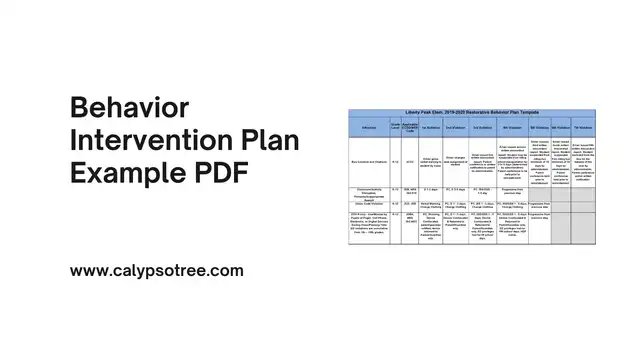Creating a respectful workplace culture is very important. It makes everyone feel valued and safe. When people feel respected, they are happier and work better.
To have a respectful workplace, we need clear communication, recognition, appreciation, and inclusion. These things help build a strong, positive environment.
What is a Respectful Workplace Culture?
A respectful workplace culture means everyone is kind and fair. It is about having harmony at work where everyone feels included.
What Does Respectful Behavior Include?
Respectful behavior includes:
- Listening to others
- Valuing their opinions
- Being polite
Importance of Mutual Respect and Inclusivity
- Mutual Respect: Everyone respects each other.
- Inclusivity: Everyone feels they belong.
These two things are key to a happy workplace. They help everyone do their best work.
Why is a Respectful Workplace Important?
When employees feel respected, they are happier and more satisfied. This leads to:
- Better work
- A positive attitude
- Higher morale
- A healthy work environment
A respectful workplace helps the whole company succeed. When everyone works well together, the company does better. Respect and cooperation lead to:
- Better results
- A stronger team
Benefits of a Respectful Workplace Culture
The benefits of a respectful workplace culture include:
- Enhanced Collaboration and Teamwork
- Improved Customer Relations
- Better Mental Health and Well-being
- Increased Organizational Reputation
- Fostering a Culture of Continuous Improvement
- Building a Culture of Accountability
How Can Companies Promote a Respectful Workplace Culture?
Policies and Practices to Encourage Respect
Companies can create rules to make sure everyone is respectful. These rules are called policies.
- Clear Rules: Clear policies help everyone know how to behave.
- Positive Environment: When everyone knows the rules, it is easier to keep a positive and respectful workplace.
For example, a company might have a rule that everyone should listen when someone else is speaking. This helps everyone feel heard and respected.
Training Programs and Workshops
Employee training programs are special classes that teach employees how to be respectful.
- Learning Respect: Employees learn what respectful behavior looks like.
- Handling Conflicts: Workshops can show how to solve problems and work well with others.
For instance, a workshop might teach employees how to talk calmly and find solutions when they disagree. These programs are very important for creating a respectful workplace.
What are the Key Elements of a Respectful Workplace?
Clear Communication
Good communication means everyone talks and listens to each other clearly.
- Understanding: Clear communication helps everyone understand each other.
- Building Trust: When people communicate well, they trust each other more.
For example, if a manager explains tasks clearly and listens to questions, employees know what to do and feel comfortable asking for help.
Recognition and Appreciation
Recognizing and appreciating employees means showing them that their hard work is noticed and valued.
- Feeling Valued: Saying “thank you” and praising good work makes employees feel important.
- Motivation: When employees feel appreciated, they are more motivated to do their best.
For example, a simple “Great job!” can make an employee feel happy and valued.
Diversity and Inclusion
A respectful workplace welcomes people from all different backgrounds. This is called diversity.
- Welcoming Everyone: Inclusion means everyone feels like they belong, no matter who they are.
- Team Spirit: When everyone feels included, it creates a strong, united team.
For example, a company might celebrate different cultures and encourage everyone to share their unique ideas. This makes everyone feel part of the team.
How Does Respectful Workplace Culture Affect Employee Productivity?
A respectful workplace culture makes employees feel good. When people feel respected, they are happier and more excited about their jobs. This excitement is called employee engagement.
- Engaged Employees: Engaged employees care about their work.
- More Productive: They want to do their best and work hard.
For example, if a manager always listens to their team and values their ideas, the team feels important. They will likely work harder because they know their efforts matter. This is how respect leads to better work and higher productivity.
Reduced Turnover and Absenteeism
When employees feel respected, they are less likely to leave their jobs. This is called reduced turnover.
- Stay Longer: Happy and respected employees stay longer with the company.
- Less Training Needed: The company does not have to spend time and money training new people.
Also, employees who feel respected take fewer sick days. This is called reduced absenteeism.
- Healthier Employees: Respectful workplaces have healthier employees because they feel less stressed.
- More Present: Fewer sick days mean employees are at work more often, doing their jobs.
Summary
- Respect -> Engagement -> Higher Productivity
- Respect -> Reduced Turnover and Absenteeism -> Stable Workforce
What are the Consequences of Not Having a Respectful Workplace?
Negative Impacts on Morale and Performance
When there is no respect in the workplace, it can make employees feel very unhappy. This is called low morale.
- Unhappy Employees: Employees feel bad and stressed.
- Poor Work: This unhappiness leads to poor performance because unhappy employees do not work as well.
For example, if a boss always ignores the ideas of their team, the team might feel like their opinions do not matter. This can make them stop trying their best, which hurts the company’s success.
Potential for Legal Issues and Conflicts
A lack of respect can also cause big problems, like conflicts and legal issues.
- Conflicts: Disrespect can lead to fights and disagreements among employees.
- Legal Troubles: If these conflicts are not fixed, they can lead to serious legal problems for the company.
It is very important to fix problems early. This helps avoid big issues later. For example, if two employees have a disagreement, it is better to talk about it and find a solution quickly. This way, small problems do not become big ones.
Summary
- No Respect -> Low Morale -> Poor Performance
- No Respect -> Conflicts -> Legal Problems
Respect in the workplace is very important. It makes employees happy, helps them work better, and keeps the company running smoothly. Without respect, there are many problems, like unhappy employees and legal issues.
How Can Employees Contribute to a Respectful Workplace Culture?
Encouraging Positive Behavior
Employees can encourage respect by being kind and helpful. Positive behavior creates a positive environment.
Reporting and Addressing Disrespect
If someone is being disrespectful, it should be reported. Addressing issues quickly helps maintain respect. Employees have a responsibility to support a positive culture.
What Role Does Leadership Play in Creating a Respectful Workplace?
Leadership’s Influence on Workplace Culture
Leaders have a big impact on workplace culture. They set the example for others. If leaders are respectful, employees will follow their lead.
Setting an Example and Enforcing Policies
Leaders should set a good example and enforce respect policies. This helps everyone know what is expected. Effective leaders create a culture of respect.
How Can Conflicts Be Managed in a Respectful Workplace?
Effective Conflict Resolution Strategies
Conflicts should be resolved quickly and fairly. Effective strategies include listening to all sides and finding a compromise.
Maintaining Open Lines of Communication
Keeping communication open helps prevent conflicts. Employees should feel comfortable talking about issues. Open communication is key to conflict resolution.
What Are Some Examples of Respectful Workplace Practices?
Implementing Regular Feedback Sessions
Regular feedback helps employees know how they are doing. It also shows that their work is valued.
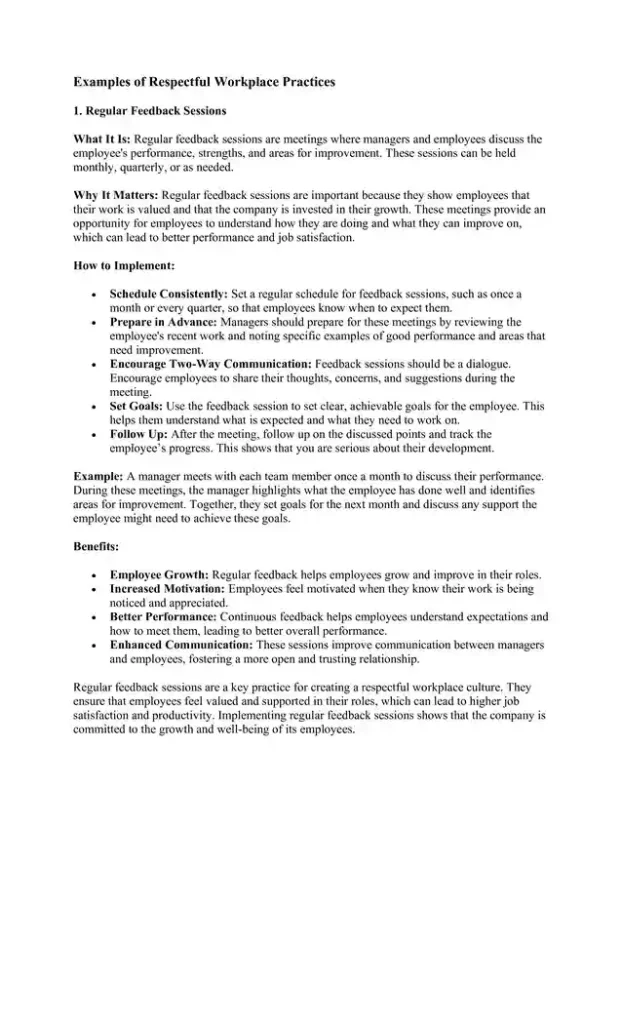
Celebrating Diversity and Inclusion Initiatives
Celebrating diversity helps everyone feel included. Diversity initiatives show that the company values everyone.
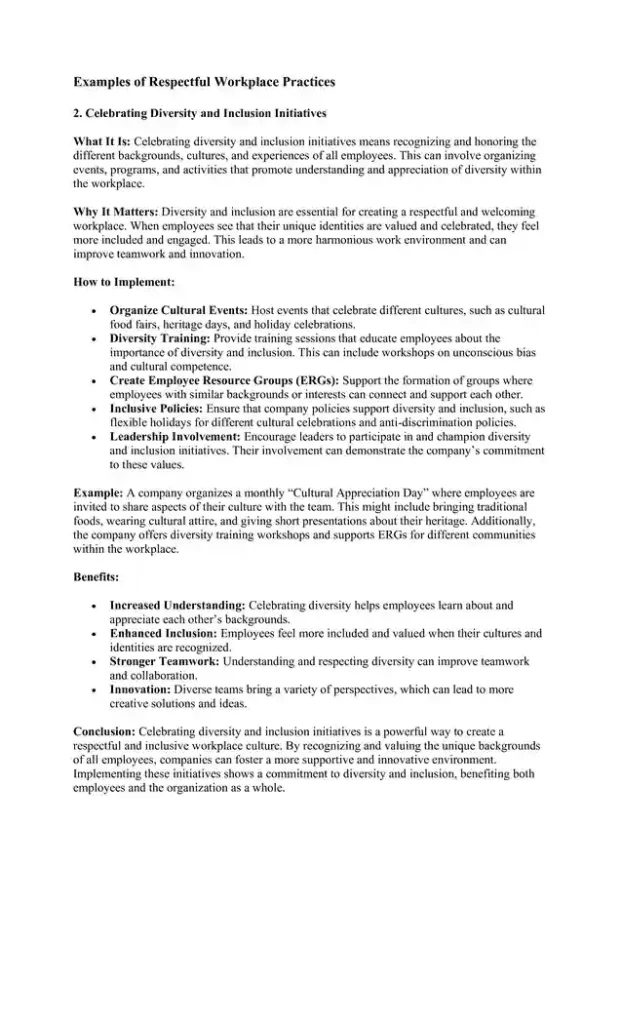
Clear and Open Communication Channels
Clear communication helps prevent misunderstandings and builds trust. Open channels allow everyone to share ideas and concerns.
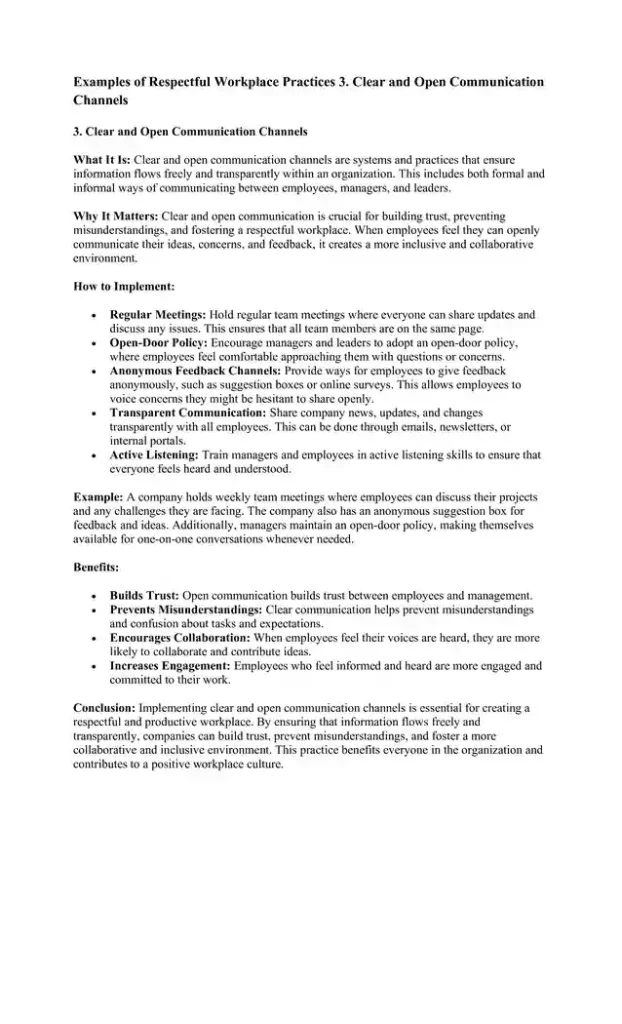
Employee Recognition Programs
Recognizing employees’ efforts makes them feel valued and motivated. Simple gestures like saying “thank you” can have a big impact.
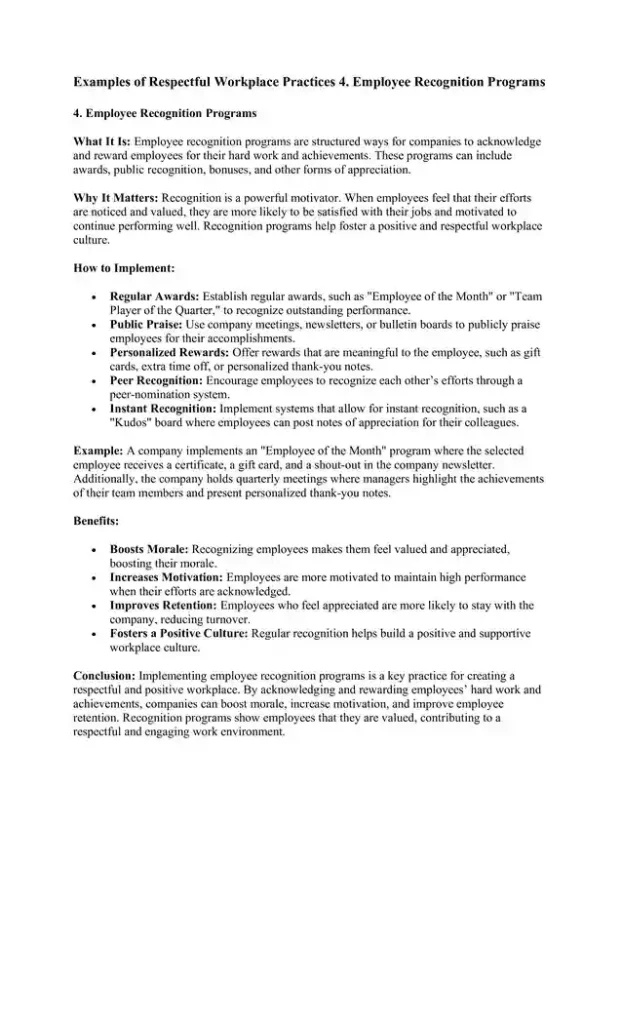
Conflict Resolution Training
Teaching employees how to handle conflicts helps maintain a peaceful work environment. Training includes listening, empathy, and problem-solving skills.
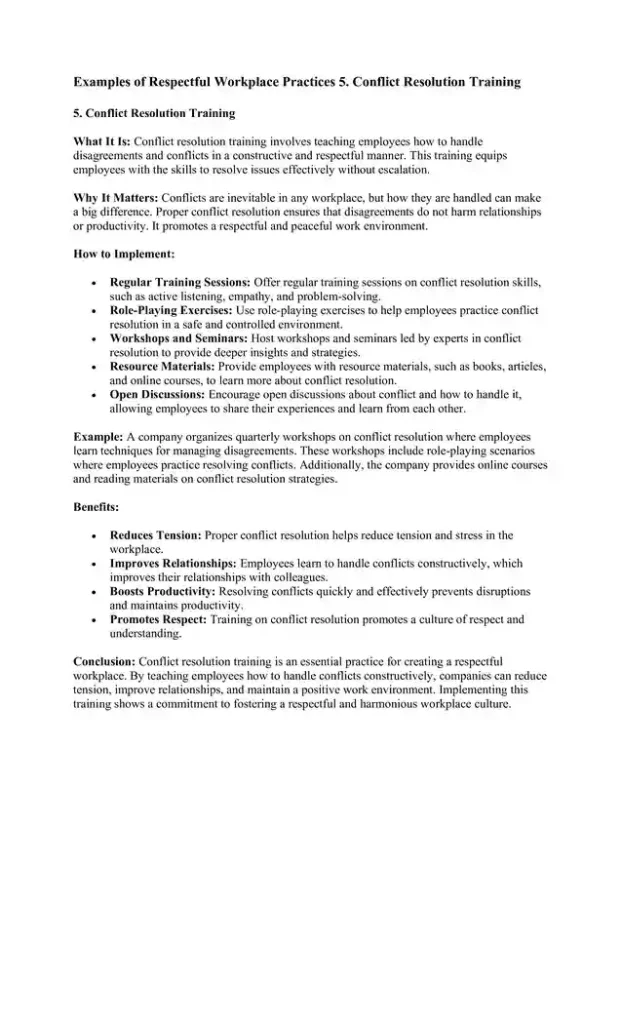
Resources:
- “According to a study by the Society for Human Resource Management (SHRM), companies with a strong respect culture see higher employee engagement and satisfaction.”
- “The Harvard Business Review emphasizes the importance of diversity and inclusion for organizational success.”
- “The American Psychological Association highlights the respect in the workplace and mental health.”
Conclusion
A respectful workplace is important for everyone. It makes employees happy and helps the company succeed. Everyone should work to create a respectful culture. It benefits both employees and the organization. Creating a positive environment takes effort, but it is worth it. Respect, communication, and appreciation are key. Everyone can contribute to a respectful workplace.

The content creator team at calipsotree.com is dedicated to making topics accessible to everyone, with over 9 years of experience in writing and breaking down complex concepts into easy-to-understand articles that answer readers’ financial questions.







